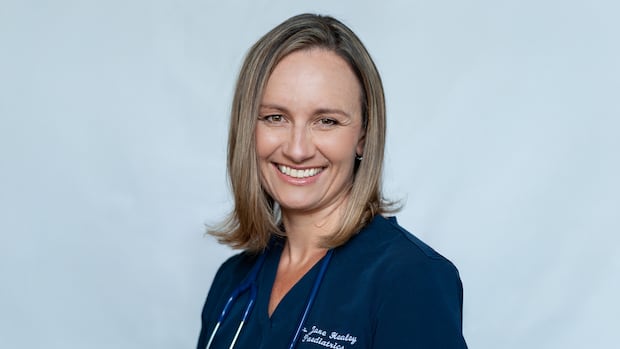Health
Doctor’s Heartfelt Decision: Caring for Dying Infant Without Pay

A Toronto-area pediatrician, Dr. Jane Healey, chose to care for a critically ill newborn without compensation, highlighting ongoing issues within the Ontario Health Insurance Plan (OHIP). After the claim for the newborn was rejected, she faced a difficult decision: request payment or burden the grieving family with more bureaucracy. Ultimately, she decided against troubling the parents during their time of loss.
The infant passed away after ten days due to a genetic condition, underscoring the emotional toll on healthcare providers dealing with such fragile situations. “That means that we aren’t remunerated for some of that very difficult, highly emotional work that stays with you,” Dr. Healey told CBC Toronto.
As a prominent figure within the Ontario Medical Association (OMA), Dr. Healey pointed out that she is not alone in facing these challenges. Billing complications within OHIP have become a critical issue as physicians negotiate a new compensation agreement with the provincial government. Recently, an arbitrator instructed both parties to expedite solutions to these matters.
According to a spokesperson for Health Minister Sylvia Jones, Ema Popovic, over 99 percent of claims are automatically processed. “This reflects the system’s productivity,” she stated. However, with more than 200 million claims submitted annually, approximately 1.16 million claims are rejected each year, leaving many physicians unpaid for their work with uninsured patients.
Dr. Healey explained that complex procedures, such as surgeries requiring multiple specialists, often result in unresolved OHIP billings. In fact, two-thirds of the claims sent for manual review fall into the category of “complex surgical claims.” This creates a disincentive for doctors to engage in innovative procedures, as noted by OMA president, Dr. Zainab Abdurrahman.
“They’re thinking, ‘wow, I’m just going to have to be fighting to prove that I already did this work,’” she remarked. This situation could potentially hinder advancements in medical care across the province.
In response to the complexities of the manual review process, which can take months and often involves intricate cases, the OMA has proposed the establishment of an OHIP ombudsman office staffed with clinical experts. This initiative aims to address the shortcomings in the current review system, where non-clinicians assess nuanced medical cases. Dr. Abdurrahman emphasized the need for qualified personnel to evaluate operating room notes and other technical documents.
The ministry, however, maintains that the existing manual review process is appropriate for complex claims, with more than 95 percent of cases resolved within 30 days. Doctors have the option to appeal decisions, which provides some level of recourse.
Both the province and the OMA are under pressure to reach an agreement concerning good-faith payments and the manual review process for complex claims. The OMA has advocated for the revival of a good-faith payment system, allowing healthcare providers to invoice for patients lacking valid health cards, such as newborns or critically ill individuals without insurance.
Popovic expressed disappointment that the OMA has chosen to concentrate on the minority of claims that require manual review, rather than acknowledging the progress made in supporting physicians. She indicated that the government is actively working to modernize the billing system to improve efficiency.
If an agreement cannot be achieved by the start of the new year, both parties can revert to arbitration as per the arbitration award’s stipulations. As the dialogue continues, Dr. Healey’s experience sheds light on the broader implications of OHIP billing issues, emphasizing the need for reform to support healthcare providers and ensure they are compensated for their critical work.
-

 Education3 months ago
Education3 months agoBrandon University’s Failed $5 Million Project Sparks Oversight Review
-

 Science4 months ago
Science4 months agoMicrosoft Confirms U.S. Law Overrules Canadian Data Sovereignty
-

 Lifestyle3 months ago
Lifestyle3 months agoWinnipeg Celebrates Culinary Creativity During Le Burger Week 2025
-

 Health4 months ago
Health4 months agoMontreal’s Groupe Marcelle Leads Canadian Cosmetic Industry Growth
-

 Science4 months ago
Science4 months agoTech Innovator Amandipp Singh Transforms Hiring for Disabled
-

 Technology3 months ago
Technology3 months agoDragon Ball: Sparking! Zero Launching on Switch and Switch 2 This November
-

 Education3 months ago
Education3 months agoRed River College Launches New Programs to Address Industry Needs
-

 Technology4 months ago
Technology4 months agoGoogle Pixel 10 Pro Fold Specs Unveiled Ahead of Launch
-

 Business3 months ago
Business3 months agoRocket Lab Reports Strong Q2 2025 Revenue Growth and Future Plans
-

 Technology2 months ago
Technology2 months agoDiscord Faces Serious Security Breach Affecting Millions
-

 Education3 months ago
Education3 months agoAlberta Teachers’ Strike: Potential Impacts on Students and Families
-

 Science3 months ago
Science3 months agoChina’s Wukong Spacesuit Sets New Standard for AI in Space
-

 Education3 months ago
Education3 months agoNew SĆIȺNEW̱ SṮEȽIṮḴEȽ Elementary Opens in Langford for 2025/2026 Year
-

 Technology4 months ago
Technology4 months agoWorld of Warcraft Players Buzz Over 19-Quest Bee Challenge
-

 Business4 months ago
Business4 months agoNew Estimates Reveal ChatGPT-5 Energy Use Could Soar
-

 Business3 months ago
Business3 months agoDawson City Residents Rally Around Buy Canadian Movement
-

 Technology2 months ago
Technology2 months agoHuawei MatePad 12X Redefines Tablet Experience for Professionals
-

 Business3 months ago
Business3 months agoBNA Brewing to Open New Bowling Alley in Downtown Penticton
-

 Technology4 months ago
Technology4 months agoFuture Entertainment Launches DDoD with Gameplay Trailer Showcase
-

 Technology4 months ago
Technology4 months agoGlobal Launch of Ragnarok M: Classic Set for September 3, 2025
-

 Technology4 months ago
Technology4 months agoInnovative 140W GaN Travel Adapter Combines Power and Convenience
-

 Science4 months ago
Science4 months agoXi Labs Innovates with New AI Operating System Set for 2025 Launch
-

 Top Stories2 months ago
Top Stories2 months agoBlue Jays Shift José Berríos to Bullpen Ahead of Playoffs
-

 Technology4 months ago
Technology4 months agoNew IDR01 Smart Ring Offers Advanced Sports Tracking for $169










